In today’s fast-paced world, businesses are constantly seeking efficient ways to process transactions and enhance customer satisfaction. However, a significant hurdle many face is finding the right card machine that aligns with their specific needs. With a plethora of options available, it’s not just about accepting credit or debit card payments anymore. Entrepreneurs and business owners are often left scratching their heads, wondering, “How much are card machines?” This question isn’t just about the upfront costs; it encompasses fees, contracts, and the compatibility with their current systems, which can significantly impact their operations and bottom line.
Imagine losing customers because your transaction process is too slow or, worse, because you can’t accept their preferred payment method. Every missed opportunity is a dent in your revenue and a gift to your competition. The market is rife with hidden fees, complicated contracts, and technical jargons that make selecting the perfect card machine a daunting task. This frustration is compounded by the realisation that making the wrong choice could lead to higher operational costs or a system that doesn’t scale with your business. The stakes are high, and the pressure to make the right decision can be overwhelming.
Our goal is to equip you with knowledge and recommendations that will not only keep your existing customers satisfied but also help attract new patrons by ensuring your business can offer efficient, diverse payment options. Say farewell to the overwhelming task of choosing the right card machine and welcome a future where informed decisions lead to streamlined, cost-effective payment processing strategies that evolve with your enterprise.
Quick Links
 |  |  |  |  |  |
Card Machines | Square Reader | SumUp | Revolut Reader | Zettle Reader | Barclaycard Anywhere |
Rating | |||||
Pricing/ | £19 | £39 | £49 | £49 | £29 |
Transaction Fees | 1.75% | 1.69% | 0.8-2.6% + 2p | 1.5-1.7% | 1.75% |
Connectivity | Wi-Fi, Bluetooth | Wi-Fi, Bluetooth | Wi-Fi, Bluetooth | Wi-Fi, Bluetooth | Wi-Fi, Bluetooth |
Square Reader
Square, an American enterprise co-founded by Jack Dorsey (also a co-founder of Twitter), has rapidly evolved into a global leader in mobile credit card processing. Handling over £84 billion ($112 USD Billion) in global payments annually, Square has made a notable entry into the UK market, swiftly becoming a favoured option for small businesses looking to embrace mobile payment solutions.
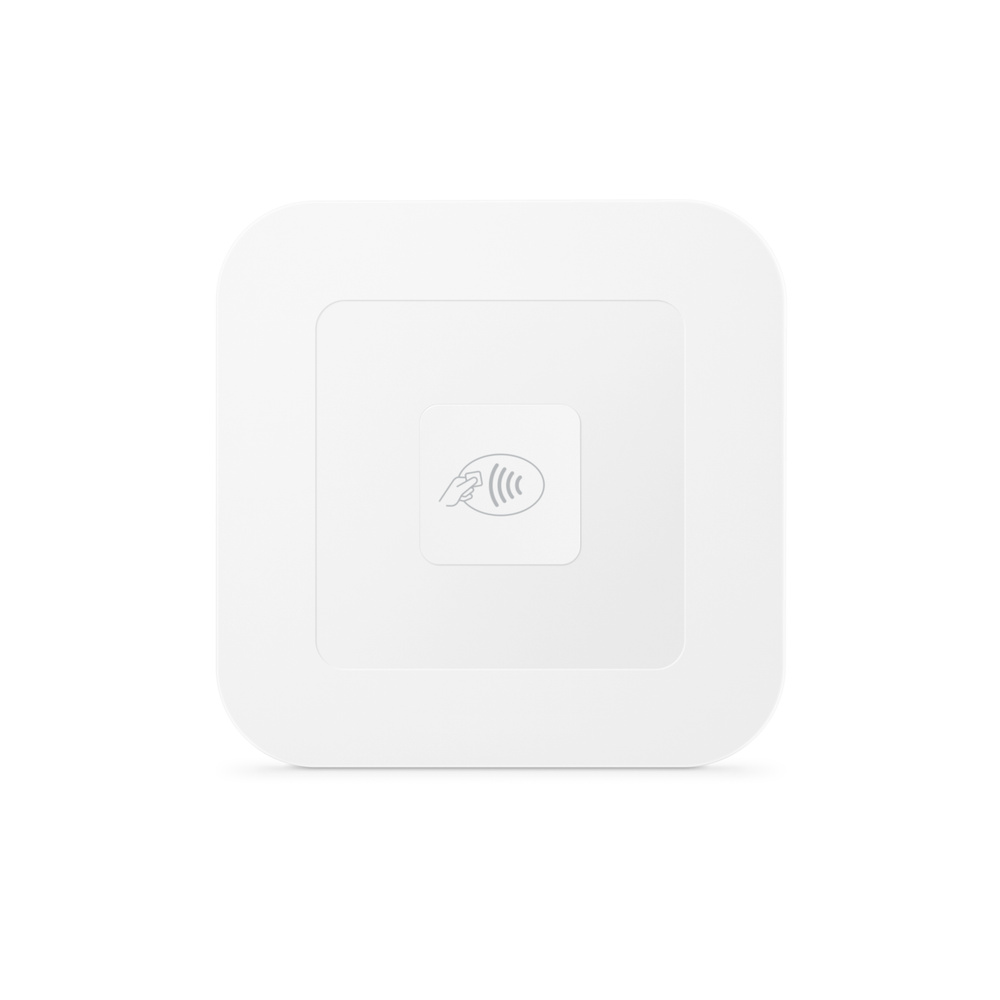
Features
The Square Reader, now in its second generation, is a compact and efficient device designed to meet the versatile payment needs of modern businesses. Here are its standout features:
Versatile Payment Acceptance: It accepts chip and PIN, contactless cards (including Visa, Mastercard, and American Express), and mobile payments like Apple Pay and Google Pay.
Fast Deposits: Funds are deposited into your bank account as early as the next business day.
Comprehensive Compatibility: Works seamlessly with both Apple and Android devices via a free point-of-sale app.
Wireless Connectivity: Connects effortlessly to devices via Bluetooth.
All-Day Battery Life: Designed to last through the busiest sales days.
Extensive Add-on Range: Offers a broad selection of optional add-ons for an enhanced sales experience.
Pricing
| Item | Cost | Notes |
|---|---|---|
| Square Reader | £19 + VAT | One-time purchase |
| Transaction Fees – Chip & PIN / Contactless | 1.75% | For all cards including Amex |
| Transaction Fees – Keyed-In / Online / Invoice | 2.5% | Due to higher risks |
| Online Payment Fees – UK Cards | 1.4% + 25p | For transactions made with UK cards |
| Online Payment Fees – Non-UK Cards | 2.5% + 25p | For transactions made with non-UK cards |
Pros
- Affordable Entry Point: At just £19 (+ VAT), the Square Reader is competitively priced, making it an accessible option for businesses of all sizes.
- No Hidden Fees: Square stands out for its transparency, charging no monthly or hidden fees. The straightforward transaction fee structure (1.75% for in-person payments and 2.5% for keyed-in, online, or invoice payments) is clear and competitive.
- Versatility and Convenience: Accepting a wide range of payment methods and compatible with various devices, Square offers businesses the flexibility and efficiency they need to cater to modern consumers.
- Rapid Access to Funds: With next-business-day deposits, Square ensures that your cash flow remains steady and accessible.
- Robust Add-On Ecosystem: From advanced terminals to POS systems, Square provides a rich suite of add-ons to expand its functionality far beyond basic payment processing.
Cons
- Transaction Fees: While competitive, the 1.75% transaction fee might not be the lowest available in the market, which could be a consideration for businesses with high transaction volumes.
- No Built-In Printer: The basic Square Reader does not include a built-in printer, necessitating a separate purchase for printed receipts.
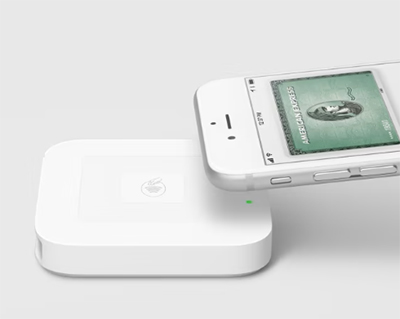
Square offers a compelling solution for businesses looking to streamline their payment processing with a modern, efficient, and versatile system. Its blend of competitive pricing, a wide array of features, and a robust ecosystem of add-ons makes it a strong candidate for businesses of all sizes.
Despite its relatively new presence in the UK, Square’s global reputation and the backing of co-founder Jack Dorsey provide a solid foundation of trust and innovation. Whether you’re a small startup or a growing enterprise, Square presents a solution tailored to modern payment demands, ensuring your business is well-equipped to handle the evolving landscape of retail transactions.
SumUp
SumUp stands out in the competitive field of credit card machine providers by offering an uncomplicated, efficient solution designed for small to medium-sized businesses. With a commitment to simplicity and affordability, SumUp has carved a niche for itself, providing a seamless payment experience for businesses and their customers alike.
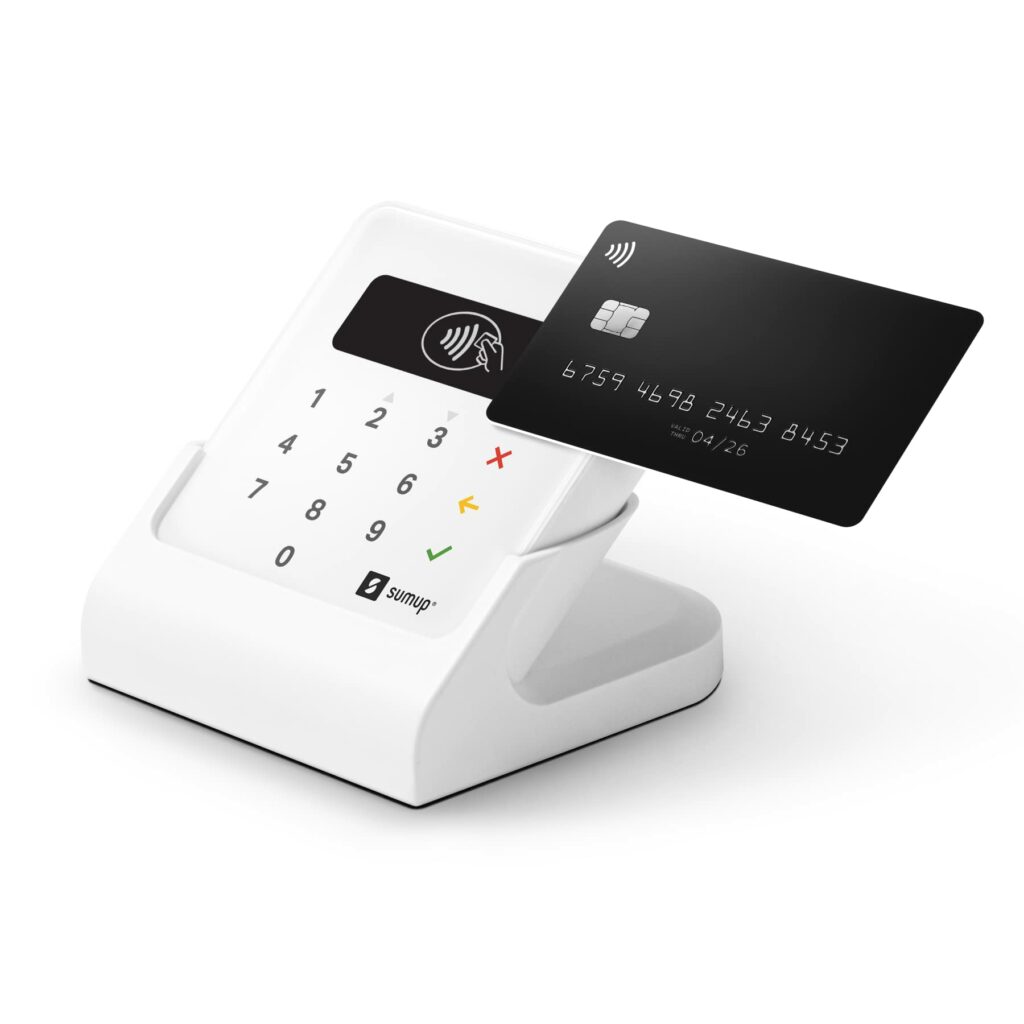
Features
The SumUp Air Card Reader is equipped with a range of features aimed at enhancing the transaction process for businesses
Broad Compatibility: Accepts all major debit and credit cards, including Visa, VPay, Mastercard, Maestro, American Express, Diners Club, Discover, and Union Pay, through Chip & PIN, contactless, and magnetic swipe.
Mobile Payments: Supports Google Pay and Apple Pay, enabling payments with just a tap of a phone or card.
Wireless Connectivity: Easily connects to iOS and Android devices via Bluetooth.
Durable Battery: Capable of processing 500 transactions on a single charge.
No Monthly Fees: Operates without fixed monthly costs, contracts, or paperwork.
Online Sales Options: Offers the ability to sell online and integrates with a dedicated POS solution, SumUp Point of Sale.
Additional Financial Tools: Provides an optional business account with a pre-paid Mastercard for streamlined financial management.
Pricing
| Item | Cost | Notes |
|---|---|---|
| SumUp Air Card Reader | £39 + VAT | One-time purchase. Lower than Zettle’s normal price but higher than Square’s promotional price. |
| SumUp Solo Card Reader | £79 + VAT | Eliminates the need for a smartphone. |
| SumUp Solo & Printer | £139 + VAT | Includes a built-in printer; no smartphone required. |
| Transaction Fees – In Person | 1.69% | Flat fee for all card transactions, slightly lower than competitors. |
| Transaction Fees – Payment Links | 2.50% | For sending payment requests to customers. |
| Transaction Fees – Invoices | 2.50% | For billing customers. |
| Transaction Fees – QR Codes | 0% | No transaction fees for QR code payments. |
Pros
- Cost-Effective: Low transaction fee of 1.69% and no monthly or hidden fees make it a budget-friendly choice.
- Ease of Use: Simple setup and user-friendly interface ensure a smooth transaction process for both businesses and customers.
- Flexibility: A wide range of accepted payment methods meets the needs of diverse customer bases.
- Portability: The compact, wireless design allows for transactions anywhere, anytime.
- No Contract: Offers freedom and flexibility with no long-term commitment.
Cons
- Higher Initial Cost: The card reader’s upfront cost is higher compared to some competitors like Square.
- Limited Add-ons: Fewer available accessories and add-ons compared to larger competitors, potentially limiting customisation options for growing businesses.
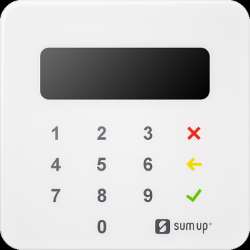
SumUp Air represents a solid choice for small businesses seeking an affordable, straightforward payment solution. While it may lack the extensive ecosystem of add-ons found with some rivals, its competitive pricing, ease of use, and the flexibility it offers make it an attractive option for entrepreneurs looking to simplify their payment processes. Whether you’re a seasoned business owner or just starting, SumUp Air provides the tools you need to accept payments efficiently and grow your business.
Revolut Reader
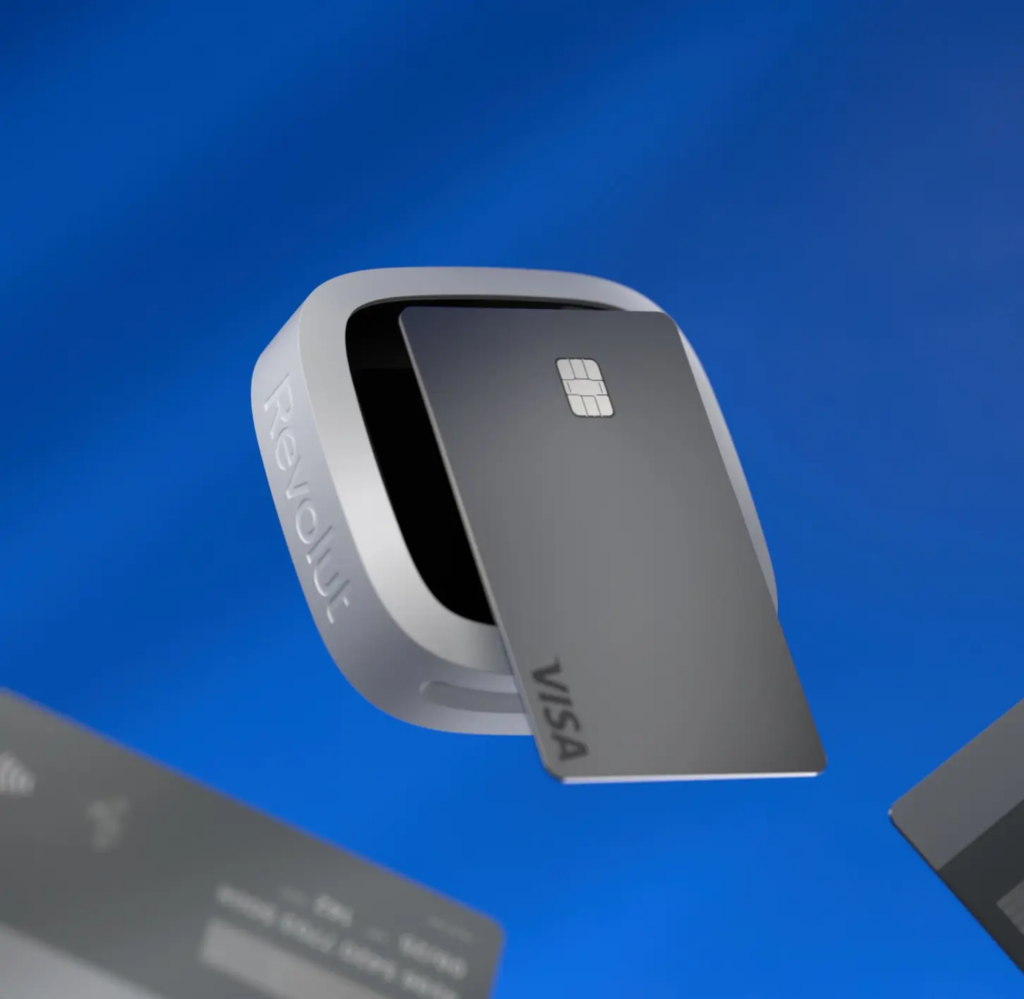
In the ever-evolving landscape of payment processing, the Revolut Reader emerges as a streamlined solution, leveraging the robust framework of Revolut’s business banking services. Known for its simplicity and competitive fees, the Revolut Reader is tailor-made for businesses seeking an efficient and cost-effective way to handle transactions.
Features
The Revolut Reader is packed with features designed to enhance the payment experience for both businesses and their customers:
Competitive Pay-per-Transaction Pricing: Offers one of the lowest fee structures in the market.
Next-Day Fund Access: Improves cash flow by ensuring funds are available the following day.
Wide Payment Acceptance: Accepts a variety of payment methods including credit/debit cards, Apple Pay, and Google Pay.
Product Catalogue Integration: Allows for easy creation and management of a product catalogue to streamline the checkout process.
30-Day Money-Back Guarantee: Offers peace of mind with a no-risk purchase.
Nobly POS Integration: Seamlessly integrates with Nobly POS for a comprehensive point-of-sale solution.
Pricing
| Item | Cost | Notes |
|---|---|---|
| Revolut Reader Cost | £49 + VAT | One-time purchase |
| Monthly Fees | £0 | Requires a free basic Revolut business bank account |
| Transaction Fees – UK Consumer Cards (in-person) | 0.8% + £0.02 | |
| Transaction Fees – International & Commercial Cards (in-person) | 2.6% + £0.02 | |
| Transaction Fees – UK Consumer Cards (online) | 1.0% + £0.02 | |
| Transaction Fees – International & Commercial Cards (online) | 2.8% + £0.02 | |
| Contract Terms | No fixed contract | Requires maintaining a Revolut business banking account |
| Add-ons and Accessories | Limited | Integration with Nobly POS available |
Pros
- Low Transaction Fees: At just 0.8% + £0.02 for UK consumer cards, it offers one of the lowest fees on the market.
- Quick Access to Funds: Next-day funding ensures efficient cash flow management.
- 30-Day Money-Back Guarantee: Provides confidence in the purchase decision.
Cons
- Bank Account Requirement: Available exclusively to Revolut Business account holders.
- Basic Model: Offers only one model with limited add-ons, potentially restricting scalability for growing businesses.
- Higher Fees for International Transactions: International and commercial card transactions incur higher fees.
Zettle Reader
Zettle has established itself as a leading mobile credit card machine provider in the UK, renowned for its simplicity, affordability, and efficiency. Designed with small businesses in mind, Zettle offers a comprehensive solution that meets the modern merchant’s needs without the burden of excessive fees or contractual obligations.
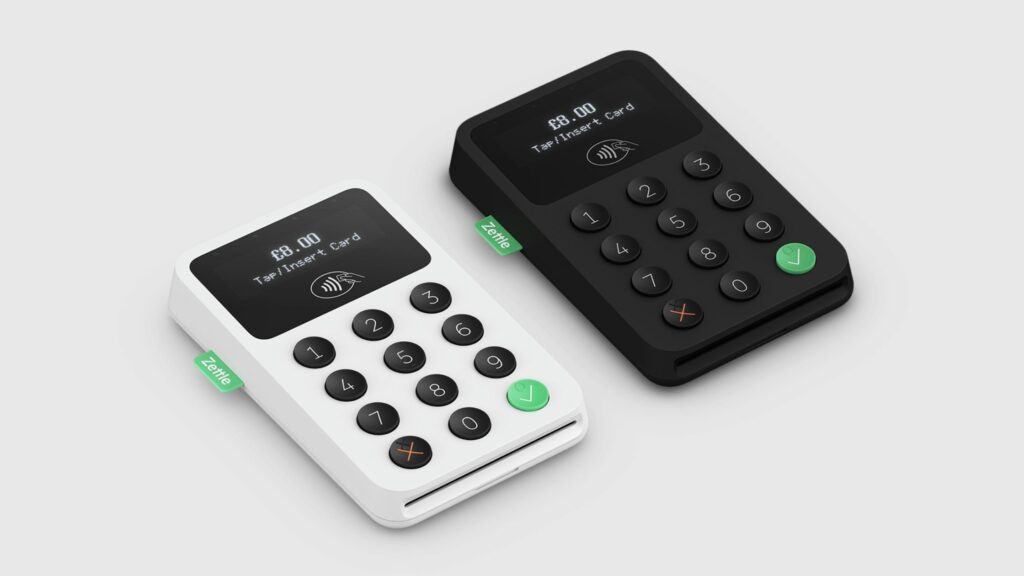
Features
Zettle’s Reader is not just another payment terminal; it’s a gateway to seamless transactions, boasting a plethora of features:
Diverse Payment Acceptance: Supports all major credit and debit cards, including VISA, Mastercard, American Express, and mobile payments like Apple Pay and Google Pay.
Rapid Contactless Payments: Takes under 5 seconds for contactless payments, streamlining customer experiences.
Online Invoice and Cash Payments: Facilitates sending online invoices and accepting unlimited cash payments.
Quick Deposits: Deposits earnings to the bank within two business days.
Enduring Battery Life: One charge lasts for 8 hours or approximately 100 transactions.
Cloud-Based Receipt Management: Sends digital receipts and stores them in the cloud.
PayPal Integration: Easily connects to existing PayPal accounts, offering more flexibility.
Warranty and Support: Comes with a free 12-month warranty.
Pricing
| Item | Cost | Notes |
|---|---|---|
| Zettle Reader 2 Cost | £59 + VAT (Promotional price: £29 + VAT) | One-time purchase cost; promotional price for new customers. |
| Transaction Fees – Card Payments | 1.75% | Flat fee for all card transactions. |
| Transaction Fees – Invoice | 2.5% | For invoice transactions. |
| Transaction Fees – Payment Link | 2.5% | For payment link transactions. |
| Transaction Fees – PayPal QR Code | 1.75% | For PayPal QR code transactions. |
| Transaction Fees – E-commerce | 2.5% | For e-commerce transactions. |
Pros
- Cost-Efficiency: One of the more affordably priced card readers in the market, with no monthly fees or contract requirements.
- Flat Fee Structure: A uniform fee for all card transactions, including AmEx, simplifies cost management.
- Ease of Integration: The seamless connection with PayPal enhances the payment process.
- Flexibility: No contract means businesses can use the service as needed without long-term commitments.
Cons
- Transaction Minimum: A minimum amount of £1 per transaction may not suit all business models.
- Competitive Fees Elsewhere: Some competitors offer lower transaction fees, which could be more appealing to high-volume merchants.
- Device Compatibility: Requires an iPhone with iOS 12 or higher, or an Android phone with 5 or higher, which might limit some users.
- Customer Satisfaction: A Trustpilot rating of 2.4 out of 5 indicates potential areas for improvement in customer service.
Barclaycard Anywhere
Barclaycard Anywhere emerges as a streamlined solution from the prestigious Barclays Bank, catering to small businesses seeking a straightforward and cost-effective card payment system. With its competitive transaction fees and essential features, it stands as a robust choice for those looking to accept card payments without the complexity of additional hardware.

Features
Contactless Payment Acceptance: Supports the latest in payment convenience including Mastercard, Visa, Apple Pay, and Google Pay.
Companion App Integration: Works seamlessly with the free Barclaycard Anywhere app for managing transactions.
Digital Receipts: Offers the option to send receipts via email, promoting a paperless transaction environment.
Real-Time Data: Access transaction data in real-time for up-to-date financial oversight.
Refunds Capability: Provides the flexibility to issue refunds directly from the device.
Data Export: Enables easy export of transaction data to spreadsheets for accounting purposes.
Pricing
| Item | Cost | Notes |
|---|---|---|
| Device Cost | £29 + VAT | Comparable to SumUp, slightly higher than Square or Zettle. |
| Transaction Fees | 1.6% | Among the lowest fixed transaction fees in the market. |
| Setup and Monthly Fees | No monthly fees | Pay-as-you-go model with no contractual obligations. |
Pros
- Cost-Effectiveness: Among the most affordable card machines, coupled with low transaction fees for cost-conscious businesses.
- Simplicity: Focuses on essential functionalities without the clutter of unnecessary add-ons, ideal for straightforward payment processing needs.
- Ease of Use: The companion app enhances user experience by providing an intuitive interface for transaction management.
Cons
- Limited Card Acceptance: The inability to process AMEX cards may be a drawback for businesses with a diverse clientele.
- Lack of Add-Ons: Absence of additional hardware like printers or advanced POS systems may limit its appeal to businesses requiring more comprehensive solutions.
So How Much Do Card Machines Cost?
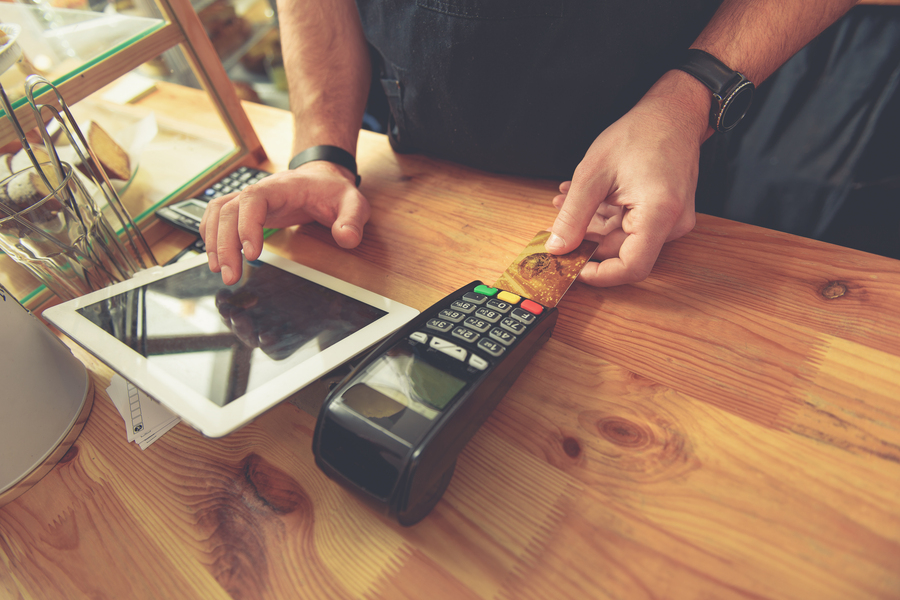
The cost of purchasing a card machine varies depending on the machine’s type, brand, and additional features. When considering the price of a card machine, it’s essential to consider other factors such as transaction rates, monthly expenses, additional fees such as setup fees, cancellation fees, and exit fees. Different card machine providers have extra charges and contract terms, making shopping around and comparing prices important. In this article, we will discuss the costs of purchasing a card machine, exploring the various factors that contribute to the overall cost of a card machine and how to decide which one is best suited for your business.
Initial Capital Outlay & Setup Costs
When purchasing a card machine, there are several costs that business owners need to bear in mind. Firstly, the initial capital outlay is associated with buying the hardware itself. The hardware cost can vary depending on the type and complexity of the machine.
Secondly, several setup costs are involved, such as installation and software integration. These costs can also vary depending on the business’s requirements and usually come as a flat fee.
Thirdly, there are several incidental fees. For example, many card machine companies charge a monthly fee for maintenance and support for their hardware. There may also be additional fees for specific features such as contactless payments.
Finally, transactional fees are charged to the business for every card transaction a customer makes. These fees can vary depending on the card and the type of business, and they may also be affected by seasonal changes and bank holidays.
Considering all these costs is essential when selecting the right deal for your business. There are many different card machine companies out there, and it’s crucial to research their pricing structure to find the most competitive deal.
Range of Card Machines Available & Prices
Various card machines are available in the market, each with varying prices. The basic types of card machines include countertops, portable, and mobile card readers. Countertop machines are the most basic and cheapest option, starting at around £20 per month, depending on the provider. Portable and mobile card readers are more expensive, ranging from £30 to £70 per month.
In addition to the prices, it is important to consider other factors, such as cheap card machine rates and PCI compliance requirements. Some providers offer lower transaction rates for cheap card machines, making them an attractive option for businesses with lower transaction volumes. Additionally, all card machines must be PCI compliant to ensure the security of customer data.
The type of card machine best suited for a business depends on its size and specific needs. For larger companies with high transaction volumes, traditional devices with lower transaction fees may be more cost-effective in the long run. Smaller businesses or sole traders may benefit from the flexibility and affordability of mobile card readers or virtual terminals.
Businesses need to consider their specific needs and compare the features and prices of different card machine companies before committing to a monthly contract, as there may be additional costs such as setup fees or cancellation fees. Good customer service, extra features such as payment links, the ability to accept different types of cards like Diners Club or American Express, and rolling contracts with no exit fees are also important factors to consider when choosing a card machine provider.
Long-Term Contracts & Cancellation Fees
Regarding card machines, long-term contracts used to be the norm. However, regulations now limit contracts to a maximum of 18 months. Cancellation fees, on the other hand, are still common in the industry.
Transaction rates and fees can vary depending on the length of the contract. Some providers offer lower transaction rates for longer-term contracts, but this may not be a good deal if you’re unsure about committing to a long-term obligation.
If you’re looking for commitment-free options, many card machine companies now offer rolling contracts with no long-term commitment. These contracts give you more flexibility if you’re uncertain about your business needs or starting.
In conclusion, it’s important to carefully weigh the pros and cons of long-term contracts and cancellation fees before committing to any particular card machine provider. Be sure to compare transaction rates and fees across providers, and consider commitment-free options if you’re unsure about your business needs. The most relevant keywords for this section are long-term contracts, cancellation fees, transaction rates, transaction fees, and commitment-free.
Additional Costs to Consider (e.g. exit fees)
When considering the cost of a card machine, it is not only the upfront purchase or leasing price that must be considered. Additional transaction fees, monthly service charges, and setup fees should also be considered.
One important factor to be aware of when signing a contract is the existence of exit fees. These fees are charged when a business wants to terminate its agreement before its agreed-upon date. The prices can vary depending on the provider and the terms of the specific contract but can often be high and significantly impact the overall cost of using a card machine.
Exit fees incentivise businesses to stay with a provider long-term and discourage switching to competitors. Companies should carefully review and understand the contract terms before signing up. It is important to pay attention to the length of the contract and any potential exit fees, as well as the transaction fees and monthly service charges.
In summary, when considering purchasing or leasing a card machine, it is important to know all the potential additional costs, including exit fees. By reviewing and understanding the contract terms, businesses can avoid unexpected expenses and ensure they select a card machine that best fits their needs at the most affordable price.
Costs of Leasing a Card Machine
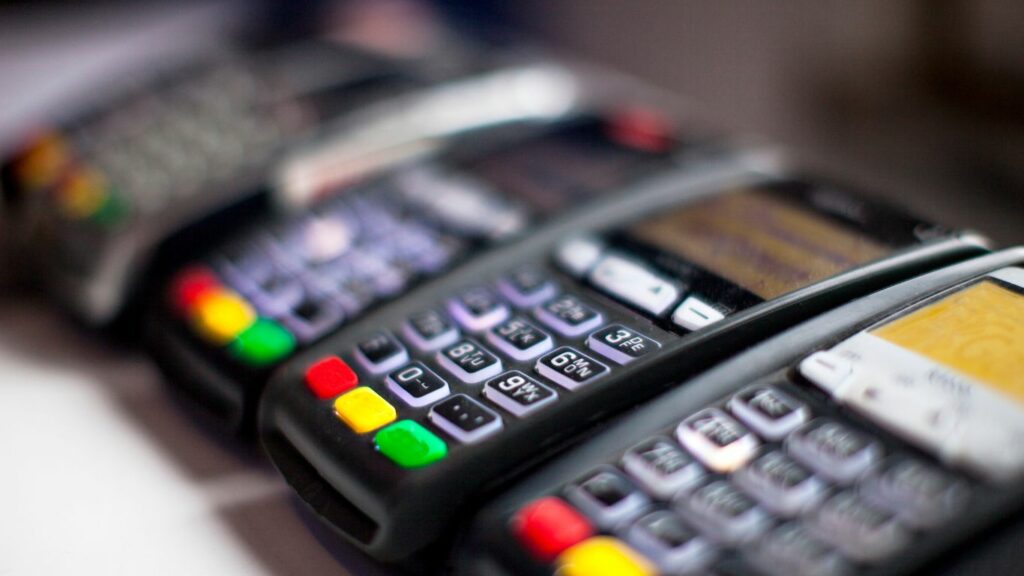
Choosing a card machine for your business can be a daunting task. There are several factors to consider, such as the type of business you’re running, transaction rates, and additional costs that come with the setup. Whether you’re a sole trader or running a large corporation, leasing a card machine could be a practical option for your payment processing needs. This article will provide an overview of the costs of hiring a card machine, including monthly expenses, setup fees, transaction charges, cancellation and exit fees, and long-term contracts.
Monthly Cost Overview
Businesses that use card payment services typically have to consider various costs associated with card machines. These costs often include minimum service charges between £10 and £30 per month. There are also transaction fees, which may be charged as a percentage of the transaction value or a flat fee per transaction, depending on the card machine provider. Businesses should be aware of additional costs, including setup fees, long-term contracts, cancellation fees, exit fees and extra charges for services such as payment links and other features.
The monthly costs associated with card machines can vary depending on the size and type of business. Sole traders and small businesses require a more affordable, portable option like mobile card readers. Larger companies, on the other hand, may need a countertop card machine that can perform transactions at a greater volume. Nevertheless, regardless of the size or type of business, companies can be eligible for Tyl services. Tyl offers competitive transaction rates, minimum monthly fees and no lengthy contracts or cancellation fees. By using the right card machine provider, businesses can save significant amounts on card processing fees, which can help to improve their profitability and performance.
Benefits of Leasing vs Purchasing
When it comes to card machines, businesses can lease or purchase them. Renting a card machine allows for lower upfront costs and regular upgrades while purchasing offers full ownership and potentially lower prices in the long term.
Leasing a card machine can be a good option for businesses that want to stay up-to-date with the latest hardware and software. With leasing, companies can often customise their package, including software and add-ons, to meet their needs. There is also flexibility with leasing, allowing businesses to change their plan or upgrade at any point during their contract.
Purchasing a card machine may be more cost-effective in the long term, as businesses will not have to pay interest or fees associated with leasing. Full ownership of the hardware also allows for more control and the potential for resale in the future. However, the initial capital outlay can be a drawback for businesses just starting or those with limited cash flow. Additionally, purchasing may make the hardware obsolete over time, requiring a full replacement rather than a simple upgrade.
Ultimately, the decision to lease or purchase a card machine depends on the specific needs and circumstances of the business. Both options offer advantages and drawbacks, making it important for business owners to carefully consider their options and choose the best fit for their business.
Fees, Transaction Rates & Charges
When it comes to using card machines, there are several fees that businesses should consider. Transaction rates can vary depending on the type of card used, and additional fees may be charged for contactless payments, mobile card readers, and setup fees.
Simplified pricing offers a flat rate for all transactions, whereas interchange plus pricing charges a percentage on top of the interchange fee set by card schemes. The monthly costs of each pricing method are important to consider, as well as whether or not they are affordable for your business.
Tyl offers a range of card machines with specific fees based on the size and type of business. For example, small sole traders will pay a 2.95% transaction fee with a £0.05 charge per transaction, whereas larger companies may pay a reduced transaction rate. There are no setup fees, exit fees, or cancellation fees with Tyl, making it easier for businesses to switch providers without incurring additional costs.
Businesses must consider the fees, transaction rates, and charges associated with using card machines before selecting a provider. Tyl’s simplified pricing and specific fees make it easier for businesses to understand and plan for costs.
Frequently Asked Questions
What Determines the Cost of Card Machines?
The cost of card machines varies based on the type, brand, features, and associated fees such as transaction rates, monthly expenses, and additional charges like setup and cancellation fees. It’s crucial to consider these factors and compare different providers to find a cost-effective solution.
How Much Does a Card Machine Cost?
Initial costs can range significantly depending on the device type and provider. For example, basic models like Square Reader start at around £19 + VAT, whereas more advanced options or those from other companies may have different pricing structures.
Are There Any Ongoing Costs with Card Machines?
Yes, beyond the purchase price, there might be transaction fees, monthly service charges, and potentially setup fees. These vary by provider and can include flat rates per transaction or percentage-based fees.
Can I Lease a Card Machine Instead of Buying One?
Leasing is an option offered by some providers, allowing businesses to use the latest machines without a significant upfront investment. Monthly leasing costs, however, should be carefully compared with purchasing options to determine the most economical choice long-term.
What Are the Advantages of Leasing Over Purchasing a Card Machine?
Leasing allows businesses to avoid a large upfront cost and often includes regular upgrades. However, it may result in higher overall costs compared to purchasing outright, especially if the machine’s long-term use is anticipated.
What Should I Look Out for in Transaction Fees and Charges?
Understand whether the provider uses a flat rate for all transactions or an interchange plus pricing model. Also, consider any additional fees for specific payment methods, and compare monthly costs across different providers to find the most affordable and suitable option for your business.
How Can I Save on Card Machine Costs?
Comparing different providers and their fee structures can help identify savings. Consider both upfront costs and ongoing fees, looking for transparent pricing without hidden charges. Utilizing promotions and negotiating terms can also lead to cost savings.
Are There Hidden Fees I Should Be Aware Of?
Yes, some providers might include hidden fees in their contracts, such as cancellation or exit fees. Carefully review contract terms and ask for all possible charges upfront to avoid unexpected expenses.
Is It Better to Have a Contract for a Card Machine?
This depends on your business needs. While contracts might offer lower transaction rates, they also bind you to a provider for a set term. No-contract options offer flexibility but might come with higher fees.
How Do I Choose the Right Card Machine for My Business?
Consider your business size, transaction volume, and specific needs. Look for a machine that accepts a wide range of payment methods, offers competitive fees, and fits within your budget. Also, consider the level of support and whether the provider offers features that can grow with your business.
Final Words
The cost considerations for card machines are significant in choosing the right provider. It is crucial to compare card processing fees from various providers to ensure potential savings. By doing so, merchants can save up to 40% on current prices, significantly impacting their bottom line.
However, potential hidden fees associated with contracts and merchant accounts need careful consideration. For this reason, it is advisable to work with a trustworthy payment processor that can provide transparent pricing and contractual terms.
Ultimately, comparing providers and carefully examining all associated fees can be time-consuming but worth it in the long run. By doing so, merchants can identify a cost-effective card machine solution that works best for their businesses and help them save money while streamlining payments.


